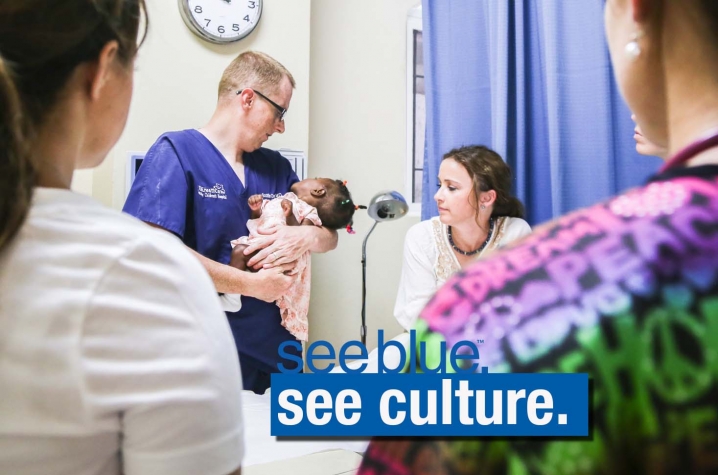UK Employees Providing Hope for Haiti
LEXINGTON, Ky. (Jan. 21, 2014) — For most of us, vacation days are used for relaxing, traveling, sight-seeing, or even just doing nothing.
For some University of Kentucky employees, however, those vacation days are put to use serving those who are less fortunate and in need of good medical care.
Recently, pediatric critical care physician Dr. Scottie Day led one such effort to help bring basic medical care to children in Haiti. Day, along with UK nurse practitioner Vicki Stringfellow, PICU nurses Johnna Forman and Kristyn Mickley, and Chief Compliance Officer Brett Short, joined a network of Lexington health care providers and community members to help open the first true children's medical center in Northern Haiti. The new medical center under a medical advisory board from Southland Christian Church is funded through Danita's Children, an organization that provides spiritual, physical, and emotional care and education for orphaned children in Haiti.
Pediatric medical care is severely lacking in Haiti. The country holds the distinction of having the highest infant mortality rate in the Western Hemisphere, and 74 percent of births occur outside a hospital setting with little to no medical support. Malnutrition is a huge problem, with 10 percent of children considered "acutely" malnourished and 20 percent of children considered underweight.
During the mission, the Lexington group split into teams of three to provide care for the incoming children, working 8 a.m. to 5 p.m. or later each day. All children who came in received a basic physical, a dental exam, an eye exam, and spiritual counseling.
"It went really well," Day said. "The beauty of it was how we were able to encompass all aspects of care. You saw such an integration of specialties under one roof so that these kids got the care they needed."
Just a few weeks prior to Day's trip, another group of medical providers went to Haiti to assist in the opening of the medical center. Over the course of these two trips, Day estimates that the groups saw 400-500 young patients, many of whom had never had a physical or simple medical evaluation. Many of the health problems they encountered were fixed with what most Americans would consider very simple, obvious solutions, such as nourishment or antibiotics.
"Some of these kids had never even been plotted on a growth chart," Day said. "And a lot of what we provided was just very simple nutritional care — the kind of thing we take for granted here."
Though the care for the Haitian children remained fairly basic this time around, Day says that the organization has plans to expand and specialize. They are in the process of forming pediatric specialty teams — orthopaedics, cardiology, neurology, and physical and occupational therapy — who will travel to Haiti to provide services for those who need it. And down the road, the organization looks to open a full-scale children's hospital with a surgical center, inpatient care, and more.
But as any missionaries will say, it's not just the children of Haiti — and beyond — who benefit from their work. Those who attend these trips say they've been profoundly changed by the experience.
"I think everyone comes back different," said Day, who has now been to Haiti on multiple missions.
Nurse practitioner Vicki Stringfellow is also no stranger to mission trips. Prior to the Haiti excursion, she had participated in a mission to Honduras. She says that the trips help refuel her passion for caring for others.
"It broadens your perspective compared to what you see here," Stringfellow said. "Your entire focus is just the pure care you're providing. You come back home with new energy."
Day agrees. "It rejuvenates you and reminds you why you went into this profession. You come back with this positive spirit — it changes you."
Though the Lexington team was in the country for only a few days, Day notes that over the course of the two weeks they were there, the mission teams helped train and left a local team in place to continue to provide health care for the Haitian children. Ultimately, these mission trips will help build up Haiti's pediatric medical programs so that they are better able to provide necessary care for their own.
In a global economy, that sort of regular engagement benefits us all, says Day. He notes that as the world and its economies become increasingly globalized, it becomes more necessary to think about health in that context.
"The health and well-being of other countries provides stability for the U.S.," Day said. "Haiti is our next-door neighbor and it's important to engage with them."
MEDIA CONTACT: Allison Perry, (859) 323-2399 or allison.perry@uky.edu









